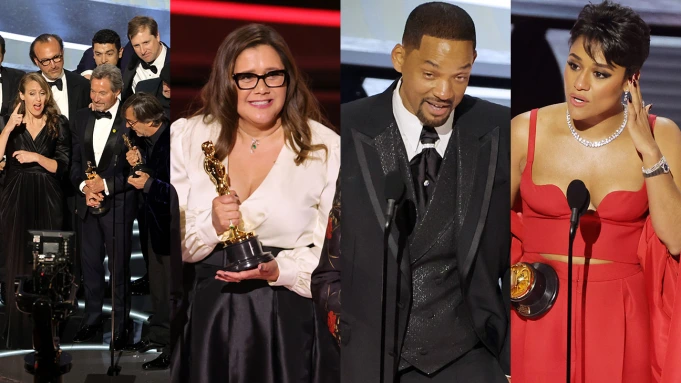CODA‘s best picture win at the 94th annual Academy Awards provided the telecast with a never-before-seen visual: a Dolby Theatre full of celebrities waving their hands aloft in the American Sign Language sign for applause, and a pair of ASL interpreters onscreen — one onstage, translating the producers’ spoken acceptance speeches for the audience, and another standing just below the platform, signing those speeches for the benefit of the film’s deaf castmembers.
The first film to center deaf characters and receive wide distribution (Apple bought the feature for $25 million at Sundance last year) became the first such movie to net the Oscars’ big prize, in addition to best adapted screenplay for writer-director Sian Heder and best supporting actor for Troy Kotsur. The latter means that both parents in CODA are played by Oscar winners: Kotsur and co-star Marlee Matlin, who 35 years ago became the first deaf performer ever to win an Academy Award.
Last year’s supporting actress winner, Youn Yuh-jung, signaled Kotsur’s win by signing “congratulations” (other viewers interpreted that she tried to sign “Troy”) before uttering his name into the microphone. The Minari and Pachinko star then stayed onstage to hold Kotsur’s brand-new statuette, freeing him up to sign his acceptance speech with both hands. “I want to thank all the wonderful Deaf theater stages where I was allowed and given the opportunity to develop my craft as an actor,” Kotsur signed as his interpreter, Justin Maurer, audibly choked up off-camera. “This is dedicated to our Deaf community, CODA community, disabled community. This is our moment.”
Heder, who is hearing, also brought up an ASL interpreter when she accepted her Oscar for best adapted screenplay. And co-host Amy Schumer signed “I love CODA; it’s my favorite movie” during the opening monologue and “good night” at the end of the evening. The ceremony also featured a number of other accessibility accommodations for the in-house audience and those at home, and Liza Minnelli used a wheelchair to present best picture alongside Lady Gaga.
“I felt that American Sign Language and the talents of the Deaf community were truly acknowledged tonight on so many levels — the official ASL live stream, Amy Schumer’s use of ASL in her opening and closing remarks, Youn Yuh-jung’s signing of ‘congratulations’ as she announced Troy Kotsur’s win, and Sian Heder’s bringing her interpreter, Heather Rossi, with her onstage so that the world could see her acceptance speech translated in ASL,” Deaf advocate and film executive Delbert Whetter tells The Hollywood Reporter. “One of the more profound sights for me was was seeing nearly everyone in the audience doing the ‘deaf applause‘ on multiple occasions — witnessing industry leaders in the room fully embrace what is such a fundamental part of Deaf culture and ASL fills me with so much hope for the countless deaf and disabled filmmakers and performers who are out there waiting in the wings.”
Another medical condition played a prominent role in the most-discussed moment of the night: Will Smith slapping Chris Rock after the presenter made a joke about Jada Pinkett Smith’s shaved head. The actress has alopecia, an autoimmune disorder that causes hair loss, and some people on social media have called Rock’s comment ableist.
The night began with Ariana DeBose picking up her expected best supporting actress statuette, making West Side Story Anitas two-for-two at the Oscars. In January, DeBose told The Hollywood Reporter that she was initially hesitant to take on the role that made Rita Moreno the first Latina performer ever to win an Academy Award. “I don’t know if there’s space for my interpretation, because I would have to play her as a Black woman,” DeBose said then. But in taking up the mantle, DeBose has now become the first Afro-Latina Oscar winner.
“You see an openly queer woman of color Afro-Latina who found her strength in life through art, and that is what I believe we’re here to celebrate,” DeBose said onstage Sunday night before going on to quote one of West Side Story‘s most famous lyrics. “So to anybody who has ever questioned your identity or you find yourself living in the gray spaces, I promise you this, there is indeed a place for us.”
Encanto‘s Yvett Merino became the first Latina producer to win an Academy Award with the movie’s animated feature win. “I am so proud to be part of a film that puts beautiful diverse characters front and center,” said the longtime Disney Animation Studios employee of Encanto, which had not one but two songs performed during the ceremony, chart-topper “We Don’t Talk About Bruno” and best song nominee “Dos Oruguitas,” which was sung in Spanish by Sebastián Yatra.
Other Oscar winners from historically excluded backgrounds included The Power of the Dog‘s Jane Campion, who in 1994 became the first woman to receive a best director nomination and now is the third woman to win; Ahmir “Questlove” Thompson for best documentary feature Summer of Soul; and King Richard star Smith for best actor.
“This is not about me, this is about marginalized people in Harlem that needed to heal from pain,” Thompson said. “But just know that in 2022, this is not just a 1969 story about marginalized people in Harlem.”
Source: The Hollywood Reporter


